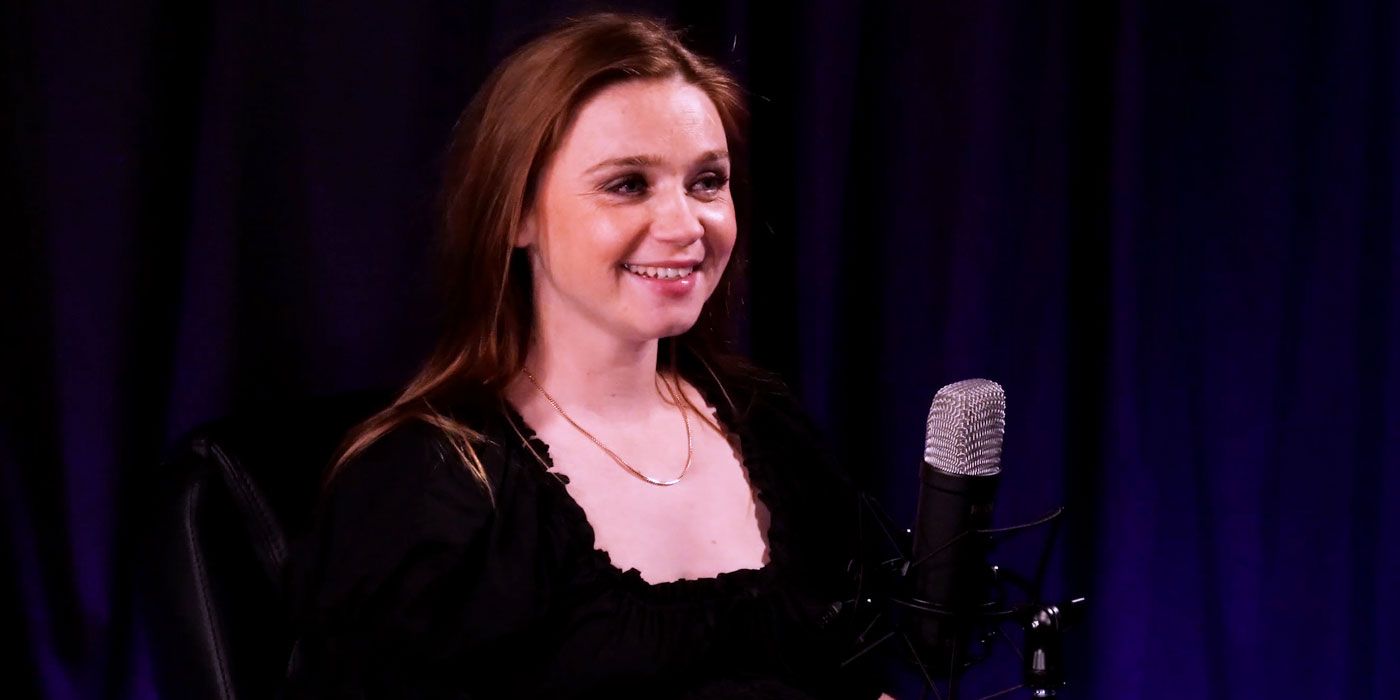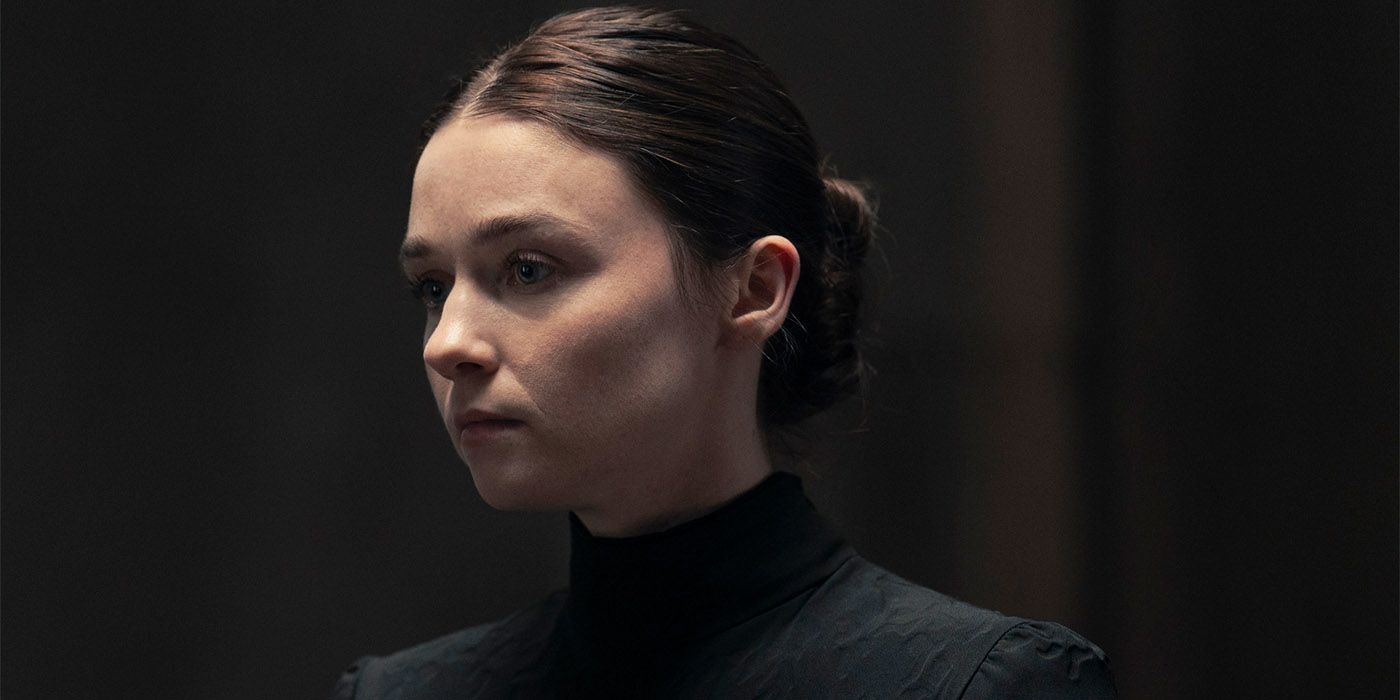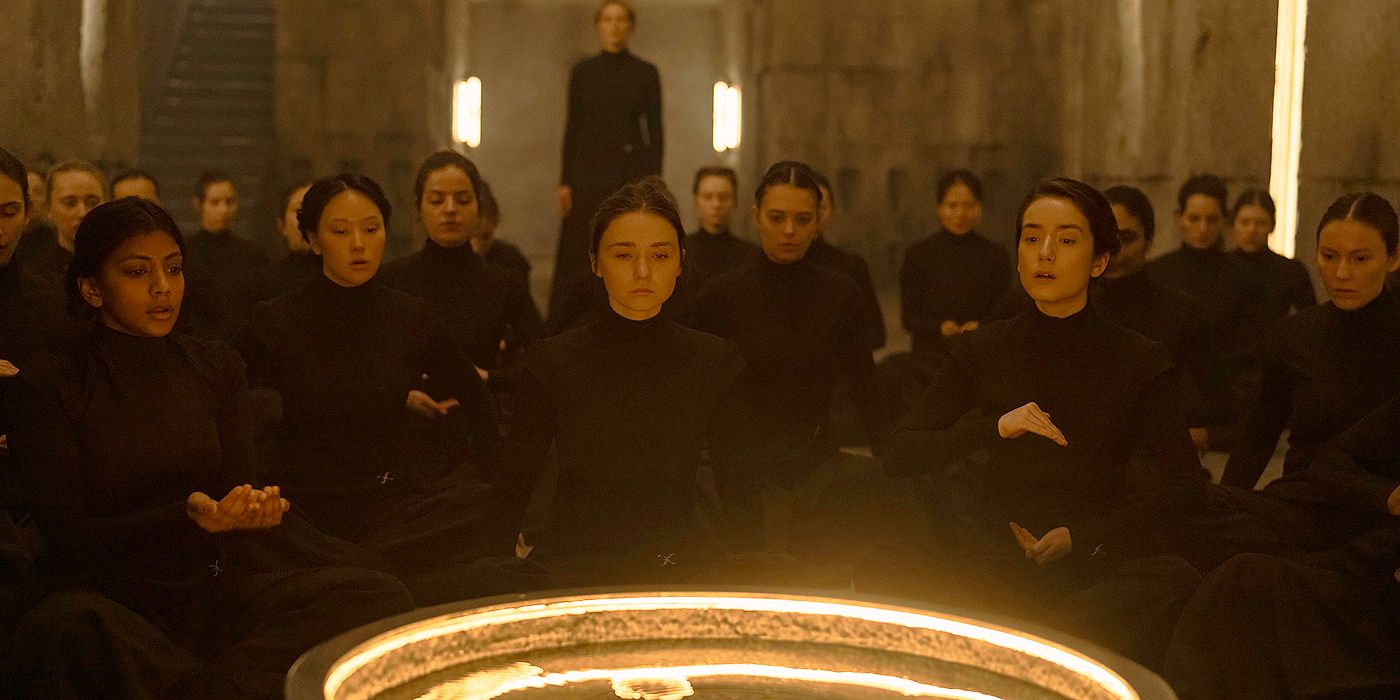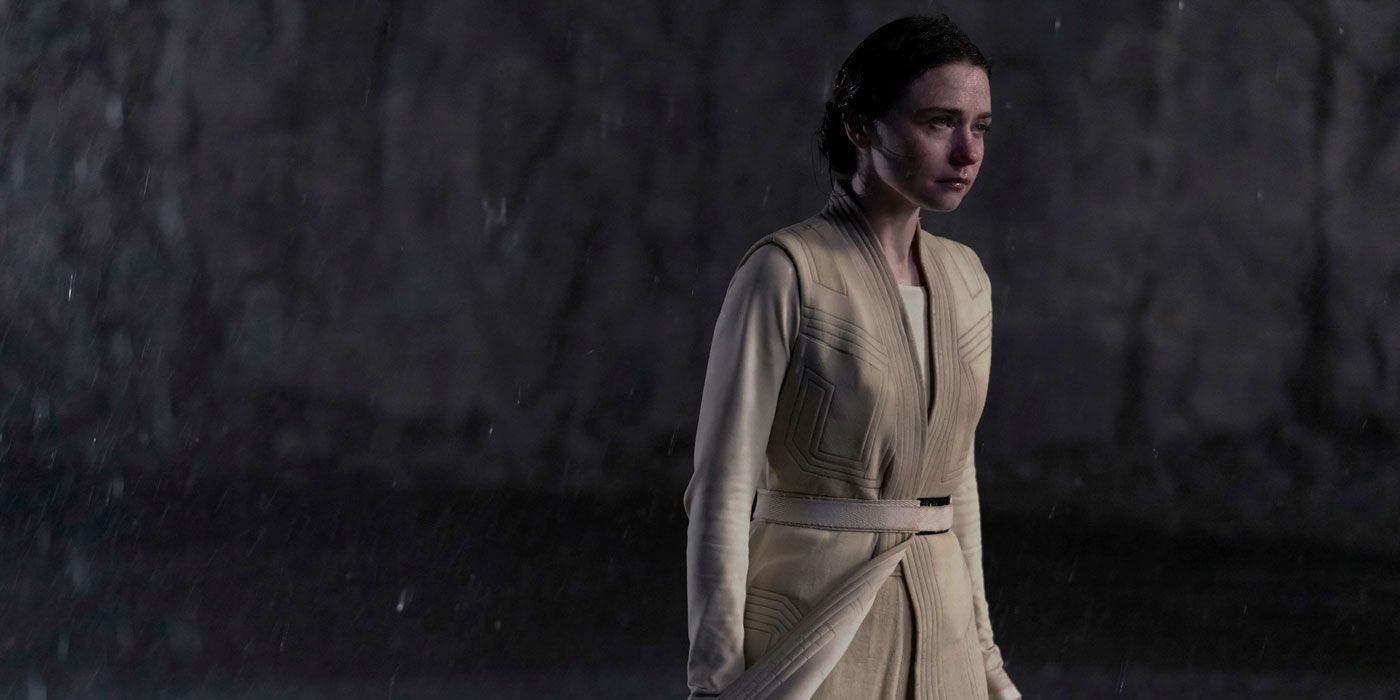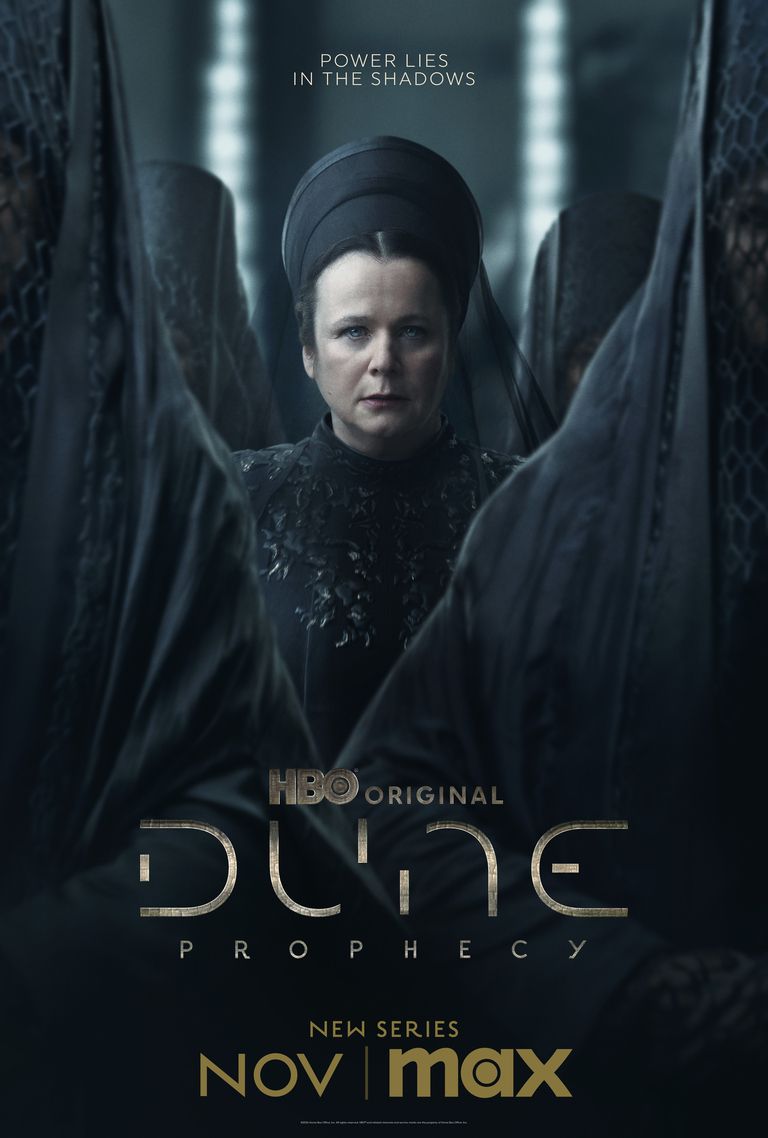Summary
- Welcome to a new episode of Collider Ladies Night with Dune: Prophecy star Jessica Barden.
- During her Ladies Night conversation with Collider’s Perri Nemiroff, Barden revisits the success of The End of the F***ing World and discusses her journey thus far with the Dune franchise.
- Barden explains the inspiration behind her character’s use of “The Voice” in Dune: Prophecy.
Jessica Barden is an undeniable force on screen. I first saw her in The End of the F***ing World on Netflix and immediately knew she had a one-of-a-kind energy that was bound to make any project she was part of sizzle. Sure enough, she did just that for a number of independent features, including Nicole Riegel’s Holler, which was named one of the Top Ten Independent Films of 2021 by the National Board of Review. Now Barden is busy stealing scenes in yet another significant way. She’s doing so in one of the most popular franchises out there opposite some of the industry’s greatest icons.
Barden plays a young Valya Harkonnen in Dune: Prophecy. While living on Lankiveil, Valya frequently butts heads with her family who seemingly have no urgency to restore the Harkonnen name by taking revenge on the Atreides. After her brother’s murder, allegedly at the hands of Vorian Atreides, Valya joins the Sisterhood where she quickly discovers she holds great power and has few limitations when it comes to using it on others to get what she wants.
With Dune: Prophecy wrapping up its first season, Barden joined me for a Collider Ladies Night conversation to revisit her journey to the franchise and to dig into how she found her Dune character alongside Emily Watson. Barden also offers her thoughts on a number of key scenes for Valya this season, and pinpoints what she’d love to see happen in the show’s recently announced second season.
“I Was Pretending To Get Out Of A Plastic Bag In The Supermarket”
Barden’s earliest inspiration wasn’t a film or specific performance, but rather local storytelling and doing impressions.
As always on Collider Ladies Night, I began the conversation by asking Barden for the movie, performance, or personal experience that made her realize she wanted to become an actor. More often than not, guests are quick to pinpoint acting legends and unforgettable films, but Barden had a different way in.
“I wasn’t in the school play or anything. There was no performance. It wasn’t like that. I come from a part of England that’s very working class, it’s countryside, it’s in the north, and people tell stories. It’s quite similar to where the Welsh guys, like Richard Burton and Michael Sheen, came up where it’s very much like pub community culture of telling stories and entertaining people, and like, who is the loudest and who is the funniest? And it’s very male-centered. It’s usually the guys that are very funny. It was that feeling that made me want to get attention and be an entertainer. It wasn’t about being in movies or being in Hollywood or a performance or an actor necessarily. It was a feeling of wanting to perform and make people laugh.”
A specific person who helped her recognize that itch to make others laugh? Her father.
“I did impersonations. My dad would do an impersonation of somebody trying to get out of a plastic bag. Everywhere that we went, my dad would do this really quite incredible, physical comedy routine of somebody trying to escape from a plastic bag, and everywhere that we were, people were obsessed with it. It was just his thing, and I was like, ‘Oh, I want to be able to do that. I want to perform like that. I want to make people feel good and make people laugh.’”
Barden would indeed go on to do just that, and then some.
How ‘The End of the F***ing World’ Changed the Game for Barden
“It was this confidence that my taste and what worked for me … there was an audience for it.”
Barden had already accomplished quite a bit by the time The End of the F***ing World came around, but there’s no denying that that show’s surprise success on Netflix had a hugely positive impact on Barden’s career in a number of ways. Yes, putting her on more radars was a big thing, but Barden’s favorite takeaway from the experience was something more personal. It validated her taste in projects. She explained:
“The main thing that it did to me was, I was right. I remember I kept telling everybody on my team at that time, I was like, ‘This show is going to be really big. I’m telling you!’ What a lot of people don’t understand about The End of the F***ing World is that our entire budget was not even one episode of a lot of this other stuff — even Sex Education that came up around the same time as it. We did not have any money. It was on the television at 11pm at night. It was set to be aired at 11pm on a website show. It wasn’t even going to be aired on main TV. Netflix were involved in it, but they were not actively making the show. It was very much like they gave us a budget, which we desperately needed, and they were creatively involved, but there was no press. We didn’t do any interviews for the show. There was no algorithm. Nothing!”
That didn’t matter to Barden though. She knew they made something special.
“I remember saying to my team, ‘This show’s gonna be really big. People are gonna be really obsessed with it. I know it.’ I could just feel it in my stomach. I was like, ‘I know that the show is going to do really well.’ It came out in the UK on TV, no one watched it, and I was like, ‘I’m telling you, when it goes on Netflix …’ And they were like, ‘We’re so glad that you’re proud of it.’ And then it blew up, and I was like, ‘I was right!’ But it wasn’t just like, ‘I was right,’ it was this confidence that my taste and what worked for me and what felt right for me and was authentic, there was an audience for it.”
Barden Explains Exactly Where Valya’s “Voice” Comes from in ‘Dune: Prophecy’
Barden continued to find her voice in Dune: Prophecy — but a different kind of voice.
Barden’s Valya is established as the first-ever user of The Voice in Dune: Prophecy, a famed ability connected to the Bene Gesserit that allows its wielder to control others by using selected tonal shifts of one’s voice. Not only is The Voice a key element of the franchise, but it also wound up being Barden’s way into her character. She explained:
“It was actually when we were thinking about what we were going to do with The Voice. We had a certain amount of rules we had to follow in terms of, it had to sound vaguely the same as what the audience was used to in the movies. There’s a style of what it needed to sound like technically [with] post-production stuff. But it was like, where does The Voice come from? What is it? And I was like, ‘Oh, guys, it’s so obvious. Everybody could have a Voice in some way.’ And when they agreed with that, I was like, ‘It’s fine. I know I can do this.’”
Where exactly does The Voice come from for Valya in particular? Here’s what Barden thinks:
“I think it’s that thing where there are people who experience rejection or neglect in childhood. They’re misunderstood in some way, and then a part of their brain develops this hyper-concentration. It’s the same as somebody standing up and singing, and you’re like, ‘Whoa, that person is amazing at singing,’ or, ‘That person is amazing at guitar.’ A lot of people have a skill that can silence people, and this is hers. It’s just a more literal manifestation of it. She can silence people with this control that she can emit in some way. When they agreed with that, I was like, ‘I get it. I know what I can do with this.’”
What If Griffin Didn’t Die in ‘Dune: Prophecy’?
“That little psychopath was always going to come out in some way.”
14:03
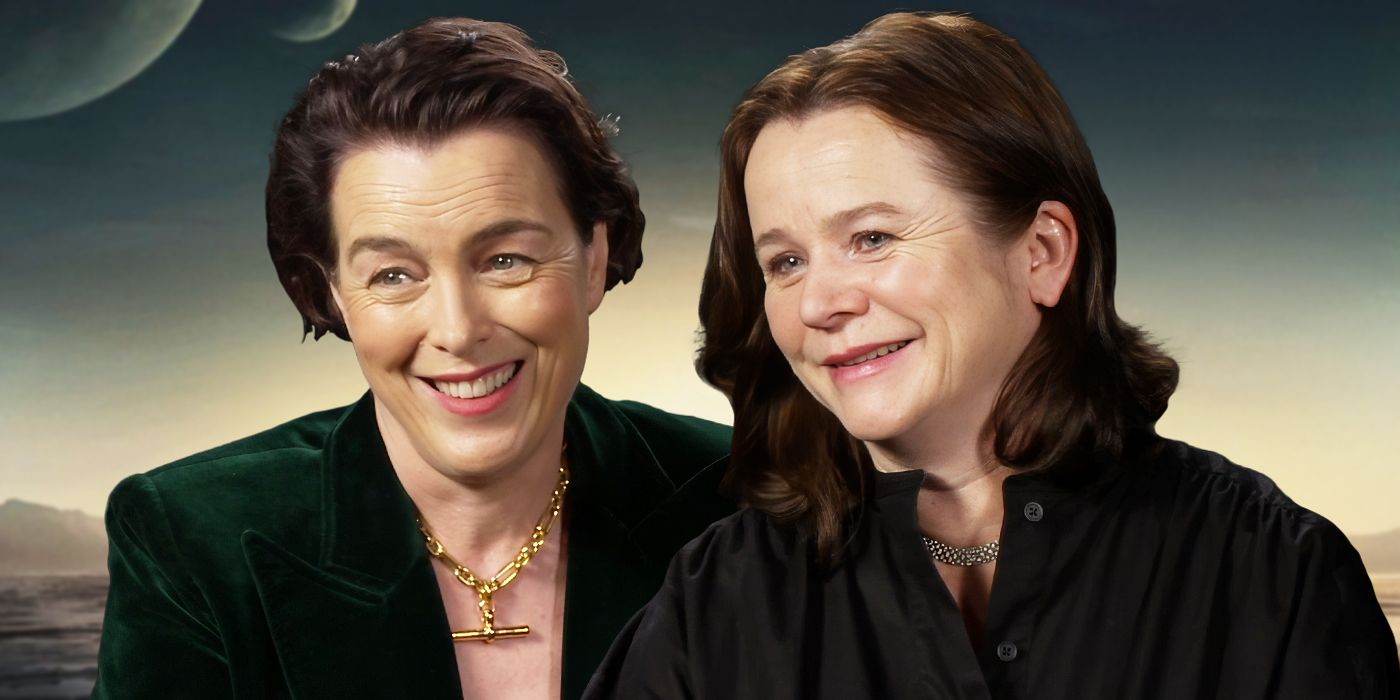
Related
Valya has the power of The Voice. That begs the question, how will she go about using it? Or better yet, does Valya have any limits in that department? Is there any line she won’t cross to forge forward in the way she sees fit?
Given Barden’s take on what might have happened had Griffin survived, the answer to that question is likely no.
“The interesting thing is that, actually, hopping on Griffin’s trajectory is such small thinking for her, because she would have been so held back by just being his Truthsayer. She probably would have eventually killed him in some way. That little psychopath was always going to come out in some way. It appears to be once she leaves Lankiveil, she’s like, ‘Oh my god, there are other people that exist who will appreciate me.’ Because the first person that she meets does appreciate her, Raquella.”
After Mother Superior Raquella (Cathy Tyson) puts the power in Valya’s hands, Barden and Watson came to the same conclusion; she’s “not a nice person.”
“We are playing somebody that is not a nice person. We decided that. We did not mess around with this whole thing where a lot of actors will be like, ‘Well, I have to like the person I’m playing.’ No, I think that she’s a completely correct version — she’s a leader that is corrupt. There’s no way for you to lead and be a good person. I don’t believe in it. I don’t believe in it now, right now. Look at what we have to look at. She’s a really flawed person. To think that you can lead an order with that much power — there’s something going on, you know? She uses people continuously.”
“No One Wants To Be in Her F*cking Club”
Barden discusses one of the most vicious scenes of the Dune: Prophecy Season 1 finale.
[Editor’s note: The following contains spoilers for Dune: Prophecy, Season 1, Episode 6, “The High-Handed Enemy.”]Dune: Prophecy Season 1 opens with Barden’s Valya using The Voice to take the life of her main adversary, Mother Dorotea (Camilla Beeput). By the time the finale rolls around, it’s abundantly clear she’s able and willing to push that power far beyond taking a single life.
With Tula (Emma Canning), Kasha (Yerin Ha), and Francesca (Charithra Chandran) by her side, Valya demands all of Dorotea’s followers to choose – follow Valya, or die. According to Barden, at that point Valya had no hope for survivors. She knew exactly what they’d do. “No one wants to be in her fucking club. No one wants to be on my side. Okay, cool. You can die then.” Barden continued:
“It was a frosty entrance, wasn’t it? It wasn’t like a nice, ‘Hi, welcome.’ I think that she thoroughly expects everybody’s going to do it. This was something that we spoke a lot about with Anna [Foerster], the director of those episodes. She’s misunderstood. People don’t like Valya. She doesn’t really understand what she needs to do to be liked. She’s so distracted by what she needs to do to feel powerful and how she avenges herself. Because it’s not even about her family anymore. It’s like, ‘How do I feel the way that I want to feel?’ And Tula is kind of loyal to such a fault, it kind of messes her up because she always has this person. But yeah, people don’t like her and I think she’s offended by it.”
Barden’s Hopes for Valya in ‘Dune: Prophecy’ Season 2
“Is she capable of falling in love?”
At the time of this recording, Dune: Prophecy had yet to receive its Season 2 renewal, but Barden still had some big ideas for story paths the show could pursue. Now that the series did indeed get the green light to forge forward, Barden’s suggestions are all on the table, beginning with a journey back in time that would allow viewers to witness what happens when Griffin goes to the war, and perhaps even Valya confronting Vorian about her brother’s death.
“I want to see Griffin go to the war. That’s the main thing. I want to go and see what actually happened, and I want to see her go and ask Vorian and he’s like, ‘I didn’t do it.’ And she’s like, ‘He’s telling the truth,’ because she used The Voice on him. That’s in the book. I want to see that. I want to see her have the realization that every decision that she made was just another lie. She doesn’t even know what the truth is. Does that make him more mad? She don’t even know who killed him. And the realization that maybe he was just killed in battle by another person, and it wasn’t this epic story. He just died. There was nothing special about it.”
Another burning question Barden would love to dig into in Season 2? “Is [Valya] capable of falling in love? Is she capable of being attracted to someone?”
Where does Barden stand on that matter at this point in time? Here’s what she said:
“I have no fucking clue. That’s what I mean. But I’d love to try and see how it pans out. What happens if she genuinely has compassion and feelings for somebody? Because I don’t think that we’ve seen it yet. What if she meets an equal? Desmond Hart is not her equal.”
Looking for even more on Barden’s journey in film and TV thus far, and her experience making Dune: Prophecy? You can catch our full Collider Ladies Night conversation in the video at the top of this article, or you can listen to the interview in podcast form below:
Dune: Prophecy Season 1 is available to stream on Max.

